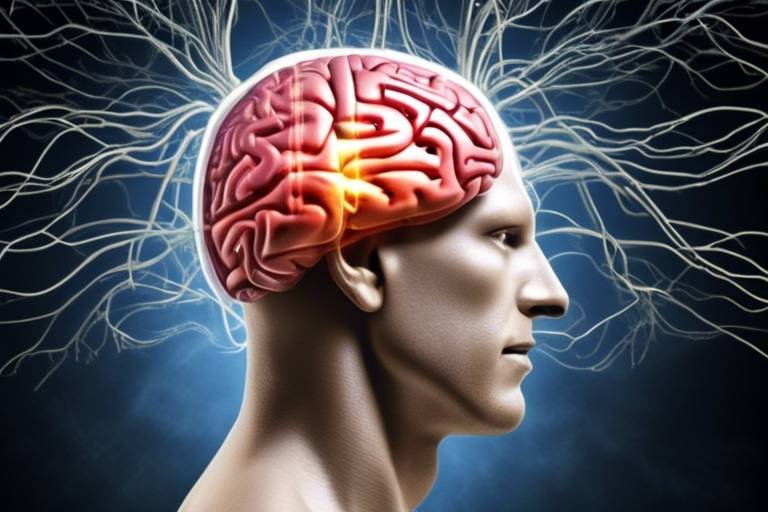Dualism, Monism, and Materialism in Philosophy of Mind
The philosophy of mind is a fascinating territory where profound questions about the nature of consciousness, perception, and existence collide. In this realm, three dominant theories emerge: dualism, monism, and materialism. Each theory offers a unique lens through which we can scrutinize the intricate relationship between the mind and the body. So, what exactly do these theories entail, and how do they shape our understanding of consciousness? Let’s dive into the depths of these philosophical concepts.
Dualism is perhaps the most intuitive of the three theories, suggesting that the mind and body are fundamentally distinct entities. Imagine your mind as a separate room in a vast mansion, while your body is the structure itself. This separation raises intriguing questions: How do these two interact? Can one exist without the other? Historically, dualism has roots in the works of philosophers like René Descartes, who famously posited that the mind (or soul) is a non-physical substance that interacts with the physical body through the pineal gland. This dualistic approach has significant implications for our understanding of consciousness, suggesting that mental phenomena cannot be fully explained by physical processes alone.
On the other hand, we have monism, which asserts that only one substance constitutes reality—be it physical or mental. Think of monism as a single, expansive ocean where all waves (representing various aspects of reality) arise from the same water. This perspective challenges the dualistic view by arguing that the distinctions between mind and body are not as clear-cut as they appear. Monism encompasses various forms, including physicalism and idealism, each offering a different take on the nature of reality. For instance, physicalism argues that everything is fundamentally physical, while idealism posits that reality is primarily mental.
To further unpack monism, let’s explore its two prominent forms:
- Physicalism: This view holds that everything, including mental states, can be explained in terms of physical processes. For example, emotions and thoughts can be traced back to neural activity in the brain. This perspective has gained traction in contemporary philosophy, particularly with advances in neuroscience.
- Idealism: In contrast, idealism suggests that reality is fundamentally composed of ideas or mental constructs. This view challenges the notion that the physical world exists independently of our perceptions. According to idealists, our experiences shape the very fabric of reality.
Now, let’s pivot to the arguments supporting dualism. Advocates of this view often cite the intuitive separation of mind and body as a compelling reason to accept dualism. After all, we experience thoughts, feelings, and consciousness in ways that seem detached from our physical existence. Furthermore, the existence of subjective experiences—often referred to as qualia—raises questions about whether physical explanations can fully account for the richness of our inner lives. However, critics of dualism argue that this separation leads to a host of philosophical dilemmas, particularly concerning how two different substances can interact.
Next, we delve into materialism, which asserts that only physical substances exist, thereby rejecting dualistic views. Materialism simplifies the equation by stating that everything, including consciousness, can be understood in terms of matter and physical processes. This perspective has gained significant traction in the scientific community, particularly with the rise of cognitive science and neuroscience. However, materialism is not without its challenges. Critics often point to the hard problem of consciousness, which questions how subjective experiences arise from purely physical processes. This dilemma highlights the ongoing debate within the philosophy of mind.
In comparing materialism and dualism, we uncover fundamental differences that fuel ongoing philosophical discussions. While dualism emphasizes the distinct nature of mind and body, materialism advocates for a unified understanding of reality, grounded in physicalism. This clash of ideas raises essential questions: Can consciousness be entirely explained through physical processes? Or is there something inherently non-physical about our mental experiences? These inquiries continue to provoke thought and debate among philosophers, scientists, and anyone intrigued by the nature of existence.
- What is dualism? Dualism is the philosophical view that the mind and body are distinct entities that interact with each other.
- How does monism differ from dualism? Monism asserts that only one substance constitutes reality, while dualism maintains that there are two separate substances: mind and body.
- What are the main types of monism? The main types of monism include physicalism, which claims everything is physical, and idealism, which suggests that reality is fundamentally mental.
- What challenges does materialism face? Materialism faces challenges such as the hard problem of consciousness, which questions how subjective experiences arise from physical processes.

Understanding Dualism
Dualism is a fascinating philosophical concept that suggests the mind and body are not just intertwined but are actually two distinct entities. Imagine your mind as a vibrant, swirling galaxy and your body as a solid, grounded planet. While they coexist, they operate on different levels of reality. This idea dates back to ancient philosophers, but it was René Descartes who famously articulated it in the 17th century. He proposed that the mind, or soul, is non-physical and exists separately from the physical body, leading to a profound inquiry into the nature of consciousness.
At its core, dualism raises critical questions about how these two separate realms interact. How does a thought—a non-physical entity—lead to physical action, like moving your arm? This inquiry has led to various interpretations and debates within the philosophical community. Supporters of dualism argue that our subjective experiences and consciousness cannot be fully explained through physical processes alone. They point to the richness of human experience, emotions, and thoughts as evidence that something beyond the physical is at play.
One of the primary arguments for dualism is the intuitive separation of mind and body. Consider how we often describe our feelings: “I feel like my mind is racing” or “My body is tired, but my mind is alert.” These expressions suggest a distinct experience of mental and physical states. Furthermore, dualism aligns with many religious and spiritual beliefs that posit an eternal soul or consciousness that transcends physical existence. This perspective resonates with many who find comfort in the idea that there is more to our existence than just our biological makeup.
However, dualism is not without its critics. Detractors argue that the separation of mind and body leads to a host of philosophical dilemmas, particularly regarding how the two interact—a problem famously dubbed the "interaction problem." If the mind is non-physical, how does it influence the physical body? This question has perplexed philosophers for centuries and continues to fuel debates in the philosophy of mind.
Despite its challenges, dualism remains a pivotal perspective in understanding consciousness. It invites us to explore the depths of human experience and the complexities of our existence. As we ponder these profound questions, we can't help but wonder: is our consciousness merely a byproduct of our physical brain, or is there something more profound at play? Dualism encourages us to delve into these mysteries, urging us to consider the intricate dance between the mind and body.
In summary, dualism offers a compelling framework for understanding the relationship between mind and body, inviting both philosophical inquiry and personal reflection. It challenges us to seek deeper truths about our consciousness and the nature of reality itself.
- What is dualism? Dualism is the philosophical view that the mind and body are two distinct entities that interact with each other.
- Who is the most famous proponent of dualism? René Descartes is often credited as the most notable proponent of dualism.
- What are some arguments against dualism? Critics argue that dualism leads to the "interaction problem," questioning how a non-physical mind can influence a physical body.
- How does dualism relate to consciousness? Dualism posits that consciousness is a non-physical entity, separate from the physical processes of the brain.

Exploring Monism
Monism is a fascinating philosophical perspective that challenges the notion of dualism by asserting that there is only one fundamental substance or reality. Unlike dualism, which divides existence into two distinct realms—the mental and the physical—monism proposes that everything is interconnected and originates from a single source. This view raises intriguing questions about the nature of consciousness and how we perceive our experiences. Have you ever wondered if your thoughts are merely manifestations of physical processes in your brain? Or if the universe is a vast tapestry woven from both mind and matter? These are the kinds of inquiries that monism encourages us to explore.
At its core, monism can be categorized into various forms, each offering a unique lens through which to view reality. For instance, physicalism posits that everything that exists is physical, while idealism argues that reality is fundamentally mental. This duality within monism itself showcases the rich complexity of philosophical thought. To illustrate this, consider the following table that summarizes the key distinctions between physicalism and idealism:
| Type of Monism | Core Belief | Implications |
|---|---|---|
| Physicalism | Only physical substances exist | All mental states are reducible to physical processes |
| Idealism | Only mental substances exist | Physical reality is a construct of the mind |
Exploring these types of monism not only deepens our understanding of the mind-body relationship but also invites us to rethink our assumptions about existence itself. For example, if all that exists is physical, how do we account for our subjective experiences, emotions, and thoughts? Conversely, if reality is primarily mental, what does that mean for the physical world we interact with daily? These questions are at the heart of monistic philosophy, urging us to consider the implications of our beliefs about existence.
Moreover, monism has profound implications for the study of consciousness. It challenges us to rethink how we define consciousness and its relationship to the brain. Are our thoughts simply the byproducts of neural activity, or is there something more profound at play? Monism encourages a holistic view of consciousness, suggesting that understanding the mind requires us to consider the entirety of our being—both physical and mental. This interconnectedness can lead to a more comprehensive understanding of human experience, bridging the gap between science and philosophy.
In conclusion, monism offers a compelling perspective on the nature of reality and consciousness. By advocating for a unified view of existence, it prompts us to question the boundaries we often draw between mind and body. As we delve deeper into these philosophical waters, we may discover that the answers to our most profound questions lie not in separation but in the intricate connections that bind us to the universe.
- What is monism? Monism is the philosophical view that all of reality is made up of one substance, either physical or mental.
- How does monism differ from dualism? Dualism posits that there are two distinct substances (mind and body), while monism asserts that there is only one fundamental substance.
- What are the main types of monism? The two primary types of monism are physicalism, which claims that only physical substances exist, and idealism, which holds that reality is fundamentally mental.
- How does monism influence our understanding of consciousness? Monism encourages a holistic view of consciousness, suggesting that our mental states are deeply interconnected with our physical existence.

Types of Monism
Monism, as a philosophical stance, is a fascinating concept that challenges the dichotomy of dualism by asserting that there is fundamentally only one type of substance that makes up reality. This idea can be further explored through various forms, primarily physicalism and idealism, each offering a unique perspective on the nature of existence and consciousness. Understanding these types is crucial for anyone delving into the philosophy of mind, as they provide a framework for interpreting the relationship between mind and matter.
To start with, physicalism is the belief that everything that exists is ultimately physical in nature. This perspective holds that all phenomena, including mental states and consciousness, can be explained entirely through physical processes and laws. Think of it like a complex machine: every part has a specific role, and when all parts function together, they create the whole. In this view, our thoughts, emotions, and experiences are merely byproducts of physical interactions occurring within our brains. The implications of physicalism are profound, suggesting that understanding the brain's workings could potentially unlock the mysteries of consciousness itself.
On the other hand, idealism posits that reality is fundamentally mental. According to this viewpoint, the material world is not the primary substance; rather, it is our perceptions and consciousness that shape reality. Imagine a painter creating a vibrant landscape on a blank canvas: the colors and forms emerge from the artist's mind, illustrating how our thoughts and ideas construct the world we experience. Idealists argue that mental phenomena are the most crucial aspects of existence, challenging the notion that the physical realm holds ultimate authority. This perspective raises intriguing questions about the nature of reality and whether it exists independently of our perception.
To summarize the distinctions between these two forms of monism, consider the following table:
| Type of Monism | Description |
|---|---|
| Physicalism | Everything is physical; mental states are byproducts of physical processes. |
| Idealism | Reality is fundamentally mental; our consciousness shapes the world around us. |
In addition to physicalism and idealism, there are other nuanced forms of monism that further enrich this philosophical landscape. For instance, neutral monism suggests that both mind and matter are manifestations of a more fundamental substance that is neither mental nor physical. This idea opens up a realm of possibilities, indicating that our traditional categorizations of existence may be overly simplistic.
Ultimately, the exploration of monism invites us to reconsider our assumptions about the mind-body relationship. Whether one leans towards physicalism, idealism, or another variant, the conversation surrounding monism is essential for understanding the complexities of consciousness and reality. It encourages us to ask deeper questions: What is the nature of existence? How do our perceptions shape the world we inhabit? And can we truly separate the mind from the body, or are they inextricably linked in ways we have yet to fully comprehend?

Physicalism Explained
Physicalism is a compelling and influential perspective in the philosophy of mind, asserting that everything that exists is fundamentally physical. Imagine for a moment that the universe is like a grand symphony, with every note and instrument representing a different aspect of reality. In this analogy, physicalism suggests that all these notes—thoughts, emotions, and even consciousness—are ultimately composed of physical matter, much like how music is made up of sound waves. This view challenges us to reconsider the very essence of our thoughts and experiences, pushing us to see them not as separate entities but as products of physical processes within the brain.
One of the key implications of physicalism is its assertion that mental states are reducible to physical states. This means that every thought or feeling we experience can be traced back to neural activities and biochemical reactions in our bodies. For example, when you feel joy, physicalism posits that this emotional state corresponds to specific patterns of brain activity, neurotransmitter releases, and even electrical impulses. This perspective offers a more scientific approach to understanding the mind, aligning closely with advances in neuroscience and psychology.
However, the implications of physicalism extend beyond mere scientific inquiry. It challenges traditional views of free will and personal identity. If our thoughts and actions are determined by physical processes, one might wonder: are we truly in control of our decisions? Or are we merely puppets of our biology? These questions provoke deep philosophical discussions, highlighting the tension between our intuitive sense of self and the physicalist view that reduces us to mere biological machines.
To further illustrate the nuances of physicalism, let's consider a simple table that outlines its key characteristics:
| Characteristic | Description |
|---|---|
| Reductionism | Mental states can be explained in terms of physical processes. |
| Scientific Basis | Aligns with empirical evidence from neuroscience and psychology. |
| Determinism | Challenges notions of free will by suggesting that all actions are determined by physical laws. |
Despite its strengths, physicalism is not without its critics. Detractors argue that it fails to account for the subjective nature of experience—what philosophers call the "qualia" of consciousness. How can a purely physical explanation encapsulate the richness of human experience, such as the taste of chocolate or the color red? This critique leads to further debates about the nature of consciousness and whether a purely physicalist perspective can ever fully explain the complexities of the mind.
In summary, physicalism invites us to view the mind as an extension of the physical world, offering a scientifically grounded framework for understanding consciousness. Yet, it also raises profound questions about the nature of reality and our place within it. As we continue to explore the depths of the mind, the dialogue between physicalism and other philosophical perspectives remains vibrant and essential.

Idealism and Consciousness
When we dive into the world of idealism, we find ourselves in a fascinating philosophical landscape where the mind takes center stage. Idealism posits that reality is fundamentally mental, meaning that our perceptions and thoughts shape the very essence of what exists. Imagine walking through a vibrant dream where every color, sound, and emotion is a product of your imagination. In the idealist perspective, this dream-like state isn't merely a fleeting experience; it’s a glimpse into the profound nature of reality itself.
At its core, idealism challenges the traditional views of reality by suggesting that the physical world is not the primary substance. Instead, it's our consciousness that plays a pivotal role in constructing the reality we experience. Think of it like a painter creating a masterpiece; the canvas (the physical world) is merely a backdrop to the vivid strokes of color (our thoughts and perceptions) that bring it to life. This perspective raises intriguing questions about the nature of consciousness: Are our thoughts simply reflections of a material world, or do they hold the power to shape it?
One of the most compelling aspects of idealism is its implications for understanding consciousness. If reality is fundamentally mental, then consciousness is not just a byproduct of brain activity but a central player in the cosmic drama. This leads to the notion that consciousness is not confined to human experience; rather, it permeates all aspects of existence. In this view, everything is interconnected through a web of consciousness, suggesting that the universe itself might be a grand thought experiment.
To further illustrate the relationship between idealism and consciousness, consider the following table, which outlines key distinctions between idealism and other philosophical perspectives:
| Philosophical Perspective | View on Reality | Role of Consciousness |
|---|---|---|
| Idealism | Reality is fundamentally mental | Consciousness shapes reality |
| Materialism | Reality is physical | Consciousness is a byproduct of brain processes |
| Dualism | Mind and body are distinct | Mind interacts with the physical body |
In conclusion, idealism presents a captivating lens through which we can explore the nature of consciousness. It invites us to reconsider our understanding of reality and encourages us to ponder profound questions: Is consciousness merely a product of our physical brains, or does it hold a deeper significance that transcends the material world? As we navigate through these philosophical waters, idealism reminds us that the mind's creative power may be the true architect of our existence.
- What is idealism in philosophy? Idealism is the philosophical view that reality is fundamentally mental and consciousness plays a crucial role in shaping our experiences.
- How does idealism differ from materialism? While idealism posits that the mind is primary, materialism argues that only physical substances exist, viewing consciousness as a byproduct of brain activity.
- Can idealism explain the nature of consciousness? Yes, idealism suggests that consciousness is not just a result of physical processes but a fundamental aspect of reality itself, influencing how we perceive and interact with the world.

Arguments for Dualism
Supporters of dualism present a variety of compelling arguments that highlight the distinct nature of the mind and body. One of the most significant arguments is the intuitive sense we have of our own consciousness. Think about it: when you ponder your thoughts, feelings, and experiences, do you really feel like they are just byproducts of physical processes? Most people would argue that there is something inherently different about mental experiences compared to physical sensations. This intuitive separation forms the bedrock of dualistic thought.
Another strong argument for dualism is the existence of subjective experiences, often referred to as qualia. Qualia are the individual instances of subjective, conscious experience—like the taste of chocolate or the color red. These experiences seem to transcend physical explanation. For instance, how can a purely physical description of brain activity account for the rich, vivid experience of tasting a delicious meal? Dualists argue that such subjective experiences point to the existence of a non-physical mind.
Furthermore, dualism finds support in the concept of personal identity. Many people believe that their identity persists over time, despite the physical changes their bodies undergo. This notion suggests that there is something more to our existence than just our physical form. Dualists argue that this continuity of identity is best explained by the existence of a non-material mind that exists independently of the body, allowing for personal experiences to remain intact even as the body ages or changes.
Moreover, dualism resonates with many people's religious and spiritual beliefs, where the mind or soul is often viewed as an eternal entity separate from the physical body. This perspective not only provides comfort to individuals grappling with the concept of mortality but also aligns with various philosophical and theological doctrines that posit the existence of an immaterial essence. In this light, dualism is not merely a philosophical stance; it is intertwined with the very fabric of human belief systems.
To further illustrate the arguments for dualism, consider the following table that summarizes key points:
| Argument | Description |
|---|---|
| Intuitive Separation | The inherent feeling of distinction between mental and physical experiences. |
| Subjective Experiences (Qualia) | The richness of personal experiences that cannot be fully explained by physical processes. |
| Personal Identity | The continuity of identity over time, suggesting a non-physical essence. |
| Spiritual Beliefs | Alignment with religious views of an eternal soul or mind separate from the body. |
In conclusion, the arguments for dualism provide a robust framework for understanding the complexities of consciousness and the mind-body relationship. While the debate continues, the dualistic perspective offers valuable insights into our experiences and the nature of existence itself.
- What is dualism? Dualism is the philosophical view that the mind and body are distinct entities that interact with each other.
- What are qualia? Qualia are the subjective, individual experiences of perception, such as taste or color.
- How does dualism relate to personal identity? Dualism suggests that our identity persists over time due to a non-physical mind that exists independently of our physical changes.
- Why do people support dualism? Many support dualism due to intuitive feelings about consciousness, subjective experiences, and alignment with spiritual beliefs.

Materialism in Philosophy of Mind
Materialism, in the context of the philosophy of mind, is a compelling perspective that asserts that only physical substances exist. This view fundamentally challenges dualistic notions, which posit a separation between the mind and body. Materialists argue that everything, including thoughts, emotions, and consciousness, can be explained through physical processes and interactions within the brain. It's like saying that the mind is just a complex computer; if we understand how the computer works, we can understand the mind. Isn't that a fascinating idea?
One of the most significant implications of materialism is its rejection of the idea that mental states can exist independently of the physical brain. This perspective aligns with scientific approaches in psychology and neuroscience, where researchers strive to explain mental phenomena through observable, measurable events. For instance, advances in brain imaging technology have allowed scientists to correlate specific brain activities with particular thoughts and feelings. This relationship poses a challenge to dualism, which maintains that the mind operates on a different plane from the body.
Moreover, materialism encourages a more empirical approach to understanding consciousness. By focusing on the brain's physical structure and its biochemical processes, materialists advocate for a model of consciousness that is rooted in the tangible world. This approach can be empowering, as it suggests that by studying the brain, we can gradually unlock the mysteries of the mind. Think of it as peeling back the layers of an onion; with each layer removed, we get closer to the core of understanding human experience.
However, materialism isn't without its critics. Detractors argue that this perspective fails to account for the subjective nature of consciousness. While materialists can describe brain processes, they often struggle to explain the qualitative aspects of experiences—what it's like to feel joy, sadness, or love. This is often referred to as the "hard problem of consciousness." Critics ask, can you really reduce the richness of human experience to mere physical interactions?
To illustrate the differences between materialism and other philosophical perspectives, consider the following table:
| Aspect | Materialism | Dualism |
|---|---|---|
| Nature of Existence | Only physical substances exist | Mind and body are distinct entities |
| Approach to Consciousness | Explains consciousness through brain processes | Considers consciousness as separate from physical processes |
| Scientific Basis | Empirical and measurable | Philosophical and metaphysical |
In conclusion, materialism offers a robust framework for understanding the mind, emphasizing the importance of physical substances and processes. While it presents a compelling narrative supported by scientific evidence, it also invites ongoing debates about the nature of consciousness and the essence of human experience. As we continue to explore these philosophical waters, one question remains: can materialism truly encapsulate the depth of what it means to be human?
- What is materialism in philosophy of mind? Materialism is the view that only physical substances exist and that mental states can be explained through brain processes.
- How does materialism differ from dualism? Materialism asserts that mind and body are not separate entities, while dualism maintains that they are distinct.
- What challenges does materialism face? Critics argue that materialism cannot fully explain subjective experiences and the "hard problem of consciousness."

Challenges to Materialism
Materialism, which asserts that only physical substances exist, has garnered significant support in contemporary philosophy of mind. However, it is not without its challenges. One of the most profound criticisms is the hard problem of consciousness, a term coined by philosopher David Chalmers. This problem questions how physical processes in the brain can give rise to subjective experiences, or qualia. For instance, when you see a vibrant sunset, what is it about the brain's activity that translates into the feeling of awe? Materialism struggles to explain this transformation from the physical to the experiential.
Another challenge arises from the phenomenon of intentionality, which refers to the capacity of the mind to represent objects and states of affairs. How can mere physical entities—like neurons and synapses—account for the way thoughts can point to things that are not physically present? This raises the question: can materialism fully encapsulate the richness of mental life? Critics argue that materialism reduces complex mental states to mere biochemical reactions, stripping away the depth of human experience.
Moreover, consider the concept of personal identity. Materialists often view identity as tied to the physical body. However, what happens to our sense of self when we think about memories or experiences that seem to transcend physical existence? If our thoughts and feelings are merely the product of our brain's chemistry, where does that leave the idea of a continuous self? This dilemma poses a significant challenge to materialism, as it struggles to reconcile the transient nature of physicality with the enduring essence of personal identity.
In addition to these philosophical dilemmas, materialism faces practical challenges in the realm of science. The field of quantum mechanics has introduced phenomena that seem to defy classical materialist explanations. For instance, the behavior of particles at the quantum level has led some to question whether materialism can adequately explain the universe's workings. This has prompted discussions about the potential need for a more integrated approach that considers both physical and non-physical elements.
Despite these challenges, materialism remains a dominant perspective in the philosophy of mind. Proponents argue that advancements in neuroscience and cognitive science continue to provide compelling evidence for a materialist understanding of consciousness. They assert that as our knowledge deepens, many of these challenges may be addressed, leading to a more nuanced view of the mind that incorporates both physical and experiential dimensions.
Ultimately, the debate between materialism and its challengers continues to be a vibrant area of discussion in philosophy. As we delve deeper into the mysteries of consciousness and the nature of reality, the dialogue between these perspectives remains crucial for understanding the complexities of the human experience.
- What is materialism in philosophy of mind? Materialism is the view that only physical substances exist and that everything, including mental phenomena, can be explained in terms of physical processes.
- What is the hard problem of consciousness? The hard problem of consciousness refers to the difficulty of explaining how physical brain processes result in subjective experiences and qualia.
- How does materialism relate to personal identity? Materialism posits that personal identity is tied to the physical body, but this raises questions about the continuity of the self across different states of consciousness.
- Can materialism explain intentionality? Critics argue that materialism struggles to account for intentionality, as it reduces complex mental states to mere physical interactions.
- What challenges does materialism face from quantum mechanics? Quantum mechanics introduces phenomena that challenge classical materialist explanations, prompting discussions about the need for a more integrated understanding of reality.

Materialism vs. Dualism
The debate between materialism and dualism is one of the most fascinating and contentious topics in the philosophy of mind. At its core, this debate revolves around the question of what constitutes reality and how we understand the relationship between the mind and the body. While materialism asserts that everything is physical and that mental phenomena can be explained entirely through physical processes, dualism holds that the mind and body are fundamentally distinct entities. This divergence leads to a myriad of implications for how we perceive consciousness and existence itself.
To better understand this clash of perspectives, let's break down some of the key differences:
| Aspect | Materialism | Dualism |
|---|---|---|
| Nature of Reality | Only physical substances exist | Mind and body are separate entities |
| Explanation of Mental Phenomena | All mental states are reducible to physical states | Mental states are independent of physical states |
| Implications for Consciousness | Consciousness arises from physical processes | Consciousness exists beyond physical processes |
One of the strongest arguments for materialism is its reliance on scientific inquiry. Materialists often point to advancements in neuroscience that demonstrate how brain activity correlates with mental states. For instance, when we experience joy, specific neural pathways are activated, suggesting a direct link between our physical brain and our emotional experiences. This perspective aligns well with the scientific method, which seeks to explain phenomena through observable and measurable evidence.
On the flip side, dualists argue that materialism fails to account for the subjective quality of experiences—what philosophers often refer to as qualia. For example, consider the experience of tasting chocolate. While materialists might explain the brain's chemical reactions during this experience, they struggle to convey the rich, subjective feeling of actually tasting chocolate. Dualists contend that this subjective experience indicates the existence of a non-physical mind that cannot be wholly explained through material processes.
Furthermore, the implications of these positions extend beyond mere academic discourse; they influence our understanding of personal identity, morality, and even the afterlife. Materialism, with its emphasis on the physical, often leads to a more deterministic view of human behavior, suggesting that our actions are the result of biochemical processes. In contrast, dualism opens the door to the idea of free will, positing that our minds can make choices independent of our physical bodies.
The tension between these two viewpoints is palpable, and philosophers continue to grapple with their implications. Are we merely complex machines, or is there something more profound at play within our consciousness? This question not only challenges our understanding of the mind but also prompts us to consider what it means to be human.
As we explore these philosophies, it's essential to recognize that neither materialism nor dualism provides a definitive answer to the mysteries of consciousness. Instead, they offer frameworks through which we can examine our existence and the intricacies of the mind-body relationship. The ongoing debate between these two perspectives invites us to reflect on our beliefs and encourages a deeper inquiry into the nature of reality itself.
- What is the main difference between materialism and dualism?
Materialism asserts that only physical substances exist, while dualism posits that the mind and body are separate entities.
- Can materialism explain consciousness?
Materialism attempts to explain consciousness through physical processes, but critics argue it cannot fully account for subjective experiences.
- What are the implications of dualism for free will?
Dualism suggests that our minds can make choices independent of physical processes, potentially supporting the concept of free will.
Frequently Asked Questions
- What is dualism in the philosophy of mind?
Dualism is the belief that the mind and body are two distinct entities. It suggests that mental phenomena are non-physical and that there is a separation between the mind (or soul) and the physical body. This perspective has roots in the works of philosophers like René Descartes, who argued that the mind and body interact but are fundamentally different in nature.
- How does monism differ from dualism?
Monism posits that there is only one fundamental substance that constitutes reality, which can be either physical or mental. Unlike dualism, which separates mind and body, monism argues that everything is interconnected. Various forms of monism, such as physicalism and idealism, further explore this idea by suggesting that either everything is physical or that reality is fundamentally mental.
- What are the main types of monism?
The two primary types of monism are physicalism and idealism. Physicalism asserts that everything that exists is physical, including mental states, while idealism posits that reality is fundamentally composed of mental entities. These distinctions are crucial in understanding how different philosophical perspectives approach the nature of consciousness and existence.
- What is materialism, and how does it relate to the philosophy of mind?
Materialism is the philosophical view that only physical substances exist, rejecting the notion of non-physical entities like the mind or soul. In the context of the philosophy of mind, materialism argues that mental states and consciousness can be fully explained by physical processes in the brain. This perspective challenges dualistic views and has significant implications for understanding human experience.
- What challenges does materialism face?
Despite its popularity, materialism encounters several challenges, particularly the "hard problem" of consciousness, which questions how subjective experiences arise from physical processes. Critics argue that materialism fails to adequately explain the richness of human consciousness and the qualitative aspects of our experiences, leading to ongoing debates in the philosophy of mind.
- How do materialism and dualism compare?
Materialism and dualism represent fundamentally different views about the nature of reality and consciousness. While dualism maintains a clear distinction between mind and body, materialism insists that everything, including mental states, can be understood in terms of physical substances. This ongoing debate highlights the complexities of consciousness and the challenges of fully understanding the mind-body relationship.



















